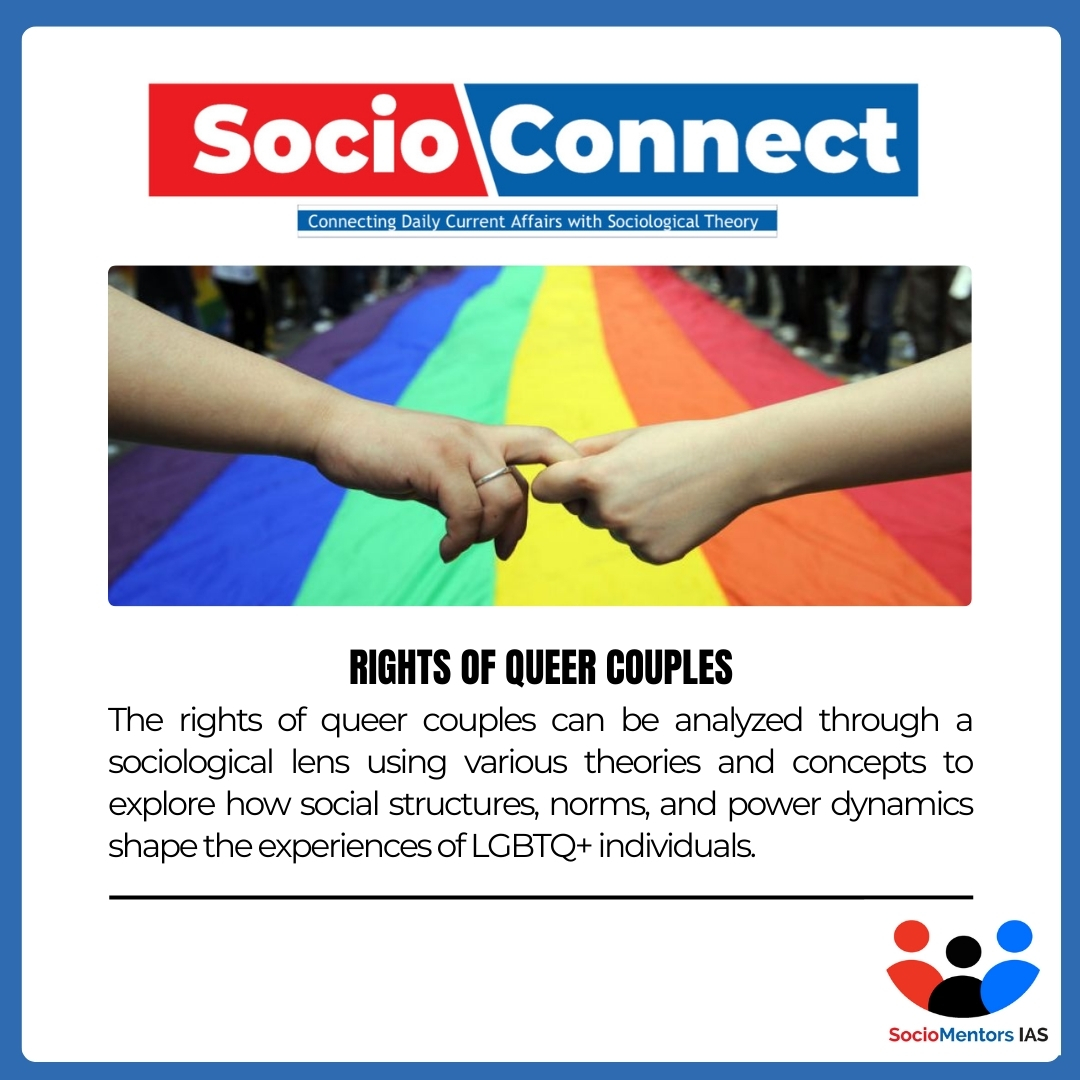Rights of Queer Couples – UPSC Sociological Perspective
September 18, 2024
Queer couples, by their very existence, challenge the traditional family structure and its associated roles of reproduction and economic stability. In India, where extended families are common and lineage is highly valued, queer relationships are often seen as disruptive. As a result, queer couples face exclusion and hostility because their relationships do not conform to the reproductive roles expected within a traditional family.
Challenges of Queer Couples:
- No Marriage Equality: Despite the decriminalization of Section 377 (which criminalized homosexuality), same-sex marriages are still not legally recognized in India.
- They cannot obtain a ration card as a family; be nominated for the payment of gratuity, provident fund benefits, or insurance benefits as a dependent spouse; or receive tax benefits for payments made on behalf of the spouse.
- The laws of succession, inheritance, alimony, and maintenance do not take queer couples into account.
- Their communications are not protected by evidentiary privilege reserved for married couples, meaning they could be compelled to give evidence against each other in court.
- They cannot donate organs to each other.
- They cannot adopt a child together.
- Without legal recognition, queer partners cannot make medical decisions for each other or access spousal benefits under health insurance or retirement plans.
- Legal Inequality: India’s domestic violence laws do not currently extend to same-sex couples. This means that queer partners facing abuse have fewer legal protections and avenues for seeking justice. In some cases, queer couples are harassed by law enforcement or government officials, particularly in rural or conservative regions, where LGBTQ+ identities are less accepted.
- Religious Intolerance and Honor-Based Violence: India’s diverse religious communities often uphold traditional views on marriage and gender roles, making it difficult for queer couples to gain acceptance within their religious groups. In extreme cases, individuals in queer relationships may face threats of violence from their own families or communities due to perceived dishonour brought by their sexual orientation.
- Discrimination in Housing: Queer couples often face difficulties when renting or buying property together. Many landlords refuse to rent to same-sex couples, and housing societies may discriminate against or ostracize them. Due to societal norms, many queer couples live together in secrecy, pretending to be friends or roommates to avoid attracting unwanted attention from neighbours or the community.
- Representation and Invisibility: Mainstream media and literature still predominantly showcase heterosexual relationships, leading to a lack of representation for queer couples. This invisibility can impact self-esteem and the ability to envision and validate one’s relationship and experiences in a broader societal context.
- Mental Health Issues: Growing up in a predominantly heteronormative society can lead to internalized homophobia, where individuals unconsciously absorb negative beliefs about queer identities. This internal conflict can impact relationships and individual mental health, requiring conscious unlearning and self-acceptance. Queer couples face a higher risk of mental health issues like depression, anxiety, and PTSD due to ongoing stigma, discrimination, and historical trauma.
Sociological Analysis
A study conducted by sociologist Anjali Gopalan, founder of the Naz Foundation, noted that queer individuals in India often face intense family pressure to marry within the heterosexual framework. Families view queer relationships as a threat to the “honour” and “stability” of the family unit, leading to coercion, forced marriages, and estrangement.
- Cultural Lag: In the context of queer couples, cultural lag is evident in the disjunction between legal reforms and cultural attitudes. While many societies, including India, have made legal strides in recognizing LGBTQ+ rights, social acceptance and cultural norms often lag behind. While the law may no longer criminalize their existence, societal perceptions often lag, meaning that queer couples are still marginalized in their communities. This lag affects their ability to access public spaces, secure housing, or gain family acceptance.
- Hegemony of Heteronormativity: refers to the dominance of heterosexual, cisgender relationships as the societal “norm”. The social exclusion of queer couples is a direct result of heteronormative hegemony, where heterosexual relationships are normalized and privileged. This social dominance creates a hierarchy of relationships, with heterosexual couples at the top and queer couples marginalized or seen as deviant.
- From an interactionist perspective, negative stereotypes about queer relationships can lead to social isolation and limited opportunities. Queer challenges are influenced by societal stereotypes and negative attitudes that reinforce discrimination.
- Queer theory also argues that the very concept of “normal” sexuality is socially constructed and is used to marginalize queer individuals. This can lead to a range of challenges, including discrimination, stigma, and limited social acceptance.
Comprehensive anti-discrimination laws should be enacted to prevent discrimination against queer couples in housing, employment, healthcare, and education. This includes ensuring protections in both private and public sectors. Laws should also be updated to allow queer couples to adopt children and secure legal recognition as co-parents. The Indian government has implemented several measures to address these issues and promote the welfare of transgender persons. For instance, the Transgender Persons (Protection of Rights) Act, 2019 aims to mitigate stigma, discrimination, and abuse against this marginalized section of society. Additionally, an umbrella scheme called “SMILE” was launched in 2022 with an allocation of Rs 365 crore for five years to further support the welfare of transgender persons.



